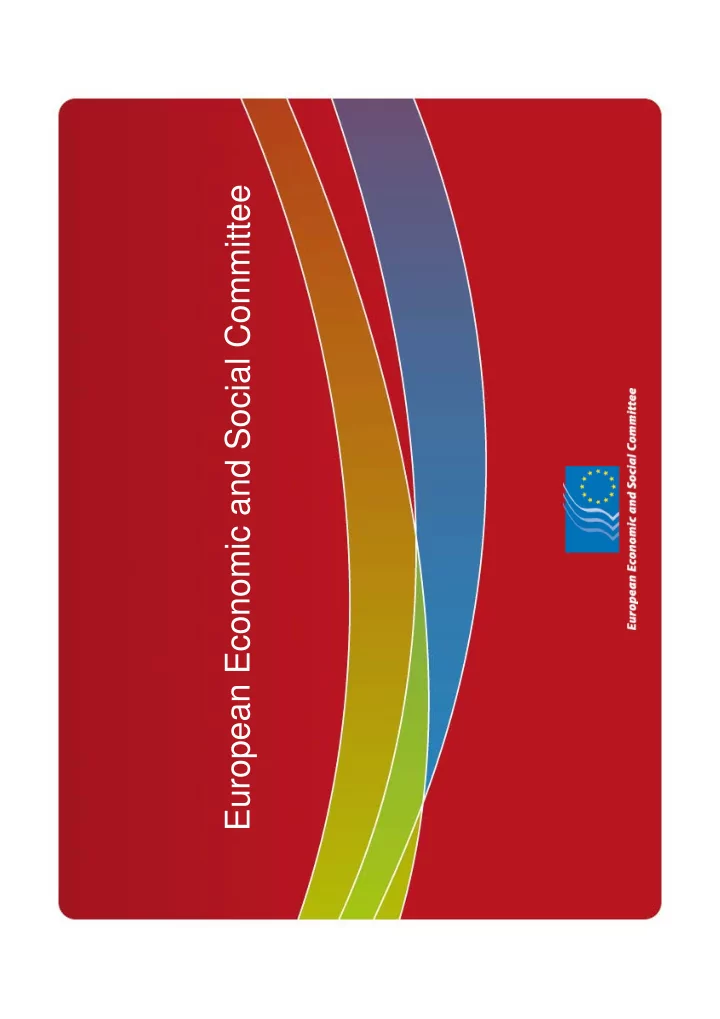

European Economic and Social Committee
Where is the EESC located?
Institutional position of the EESC European Commission
Who sits on the EESC? • Treaty of Rome 1957 • Representatives of the various categories of economic and social activity • Treaty of Nice 2000 • Representatives of the various economic and social components of organised civil society
What is organised civil society? • Organisations representing producers, farmers, carriers, workers, dealers, craftsmen, professional occupations, consumers and the general interest • Organised civil society’s role is to act as an intermediary between the public authorities and citizens
What is the structure of the EESC? • It is an assembly of 344 members from the 27 Member States of the EU. • Members are appointed for a renewable four-year term . • They are appointed by the Council of Ministers on the basis of lists drawn up by national governments.
An assembly divided into three GROUPS • Group I – Employers • Public and private sectors of industry, commerce, finance, etc. (large companies) • Group II – Employees • National trade union confederations • Group III – Various Interests • Farmers, consumers, the social economy, craftsmen and SMEs, social and environmental NGOs, the professions…
Decision-making bodies of the EESC • The presidency • The bureau • The plenary assembly
The EESC’s working bodies • Six sections… • Single Market, Production and Consumption • Transport, Energy, Infrastructure and the Information Society • Agriculture, Rural Development and the Environment • Economic and Monetary Union and Economic and Social Cohesion • Employment, Social Affairs and Citizenship • External Relations
The EESC’s working bodies • …and five more recent bodies • The Consultative Commission on Industrial Change – CCMI • The Single Market Observatory – SMO • The Sustainable Development Observatory – SDO • The Labour Market Observatory – LMO • The Lisbon Strategy Observatory – LSO • The members and the various working bodies are assisted by a secretariat-general.
The activities of the EESC • The role of the Committee is to issue opinions • (approx. 150 per year) • 1957 Treaty of Rome • The Committee may be consulted by the Council or the European Commission • 1997 Treaty of Amsterdam • The Committee may be consulted by the Council, the European Commission or the European Parliament • Mandatory or optional referrals
The activities of the EESC • In addition, the EESC • has the right of initiative • may issue exploratory opinions • takes on the role of facilitator and promoter of civil dialogue
Working methods • To issue opinions, the sections usually set up “study groups” , each with a rapporteur • A continual quest for a “dynamic compromise” • Constructive debate based on expertise • A vote is taken in the section , and then in the plenary session
Pattern of work • 9 plenary sessions per year • Each of the 6 sections generally meets once a month • Each study group meets between one and three times
The Committee, facilitator of civil dialogue • Regular contact and cooperation with networks of national economic and social councils and with civil society organisations • at the level of the European Union • in Member States and other European countries • in Euromed partnership countries • in African, Caribbean and Pacific (ACP) states • in Mercosur states and other Latin American countries • in India, China, etc.
Challenges for the future… • to optimise the Committee's role as a consultative body to the European Parliament, Council and European Commission by stepping up cooperation • to improve the EESC's representativeness and credibility as the institutional representative of civil society • to reinforce the EESC's presence in the debate on the future of Europe
The added value of the EESC • a major repository of expertise • the search for consensus (“dynamic compromise”) • its role as a channel of communication between civil society organisations and the European Union’s institutions • a real impact on the European Union’s legislative process
Its consultative role and its dialogue with civil society organisations… …make the EESC one of the most active protagonists and promoters of… … PARTICIPATORY DEMOCRACY.
The vice-presidents The president Irini Pari Greece Employers Group (I) Seppo Kallio Finland Mario Sepi Various Interests Group (III) Italy Employees Group (II)
The Group presidents Henri Malosse Georgios Dassis Staffan Nilsson France Greece Sweden Employers Group (I) Employees Group (II) Various Interests Group (III)
Rue Belliard 99, 1040 Brussels, Belgium www.eesc.europa.eu Tel.: +32 2 546 90 11 Fax: +32 2 513 48 93
Recommend
More recommend